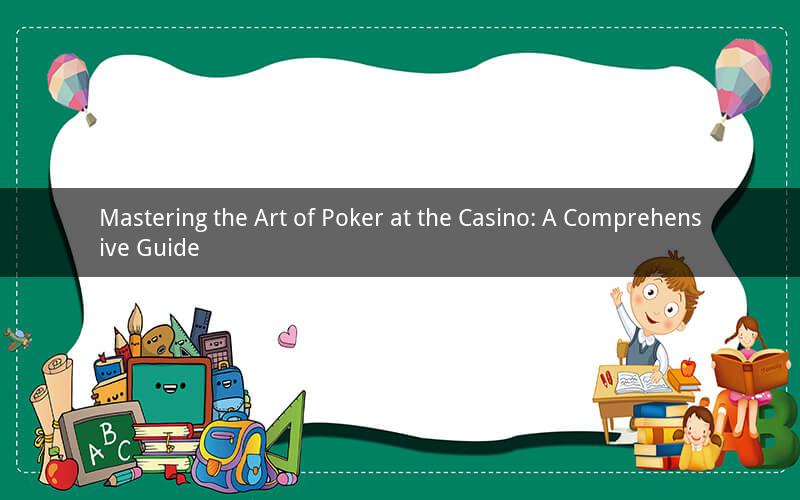
Playing poker at the casino can be an exhilarating experience, offering a blend of skill, strategy, and a touch of luck. Whether you are a seasoned poker player or a beginner looking to dive into the world of cards, this guide will provide you with valuable insights on how to play poker at the casino. From understanding the rules to mastering the art of bluffing, we will cover everything you need to know to become a poker pro at the casino.
1. Understanding the Basics of Poker
Before you step into the casino, it's crucial to have a solid understanding of the basics of poker. Poker is a card game that involves betting and raising, with the objective of having the best hand at the end of the round. Here are some key elements to grasp:
a. Poker Hand Rankings: Familiarize yourself with the different poker hand rankings, from high card to royal flush. Knowing which hand beats which is essential for making informed decisions during the game.
b. Types of Poker Games: There are various types of poker games, such as Texas Hold'em, Omaha, Seven-card stud, and more. Each game has its own set of rules and strategies, so it's important to choose the one that suits your skill level and preferences.
c. Blinds and Antes: Blinds and antes are forced bets placed at the beginning of each round. They help create an atmosphere of action and prevent players from sitting out for extended periods.
2. Choosing the Right Casino
When it comes to playing poker at the casino, choosing the right establishment is crucial. Here are some factors to consider:
a. Reputation: Look for casinos with a good reputation for fair play and a welcoming atmosphere. Reading reviews and asking for recommendations can help you make an informed decision.
b. Game Selection: Different casinos offer different types of poker games. Choose a casino that offers the game you are interested in or one that offers a variety of games to cater to different skill levels.
c. Tournament Options: If you are interested in playing poker tournaments, choose a casino that hosts regular tournaments and offers attractive prizes.
3. Developing Your Poker Strategy
Playing poker at the casino requires a combination of skill, strategy, and discipline. Here are some key strategies to help you improve your chances of winning:
a. Position: Your position at the table can significantly impact your success. Being in a good position allows you to gather more information about your opponents and make more informed decisions.
b. Reading Opponents: Pay attention to your opponents' behavior, betting patterns, and tendencies. This information can help you identify strong and weak players, allowing you to make strategic decisions.
c. Bluffing: Bluffing is an essential skill in poker. It involves betting with a weak hand to make your opponents believe you have a stronger hand. However, bluffing should be used sparingly and with caution.
4. Managing Your Bankroll
Bankroll management is crucial for any poker player, regardless of their skill level. Here are some tips to help you manage your bankroll effectively:
a. Set a Budget: Determine how much money you are willing to spend on poker and stick to it. Avoid chasing losses and never borrow money to play.
b. Start Small: If you are a beginner, start with smaller stakes to gain experience and build your confidence. As you improve, you can gradually move up to higher stakes.
c. Track Your Wins and Losses: Keep a record of your wins and losses to analyze your performance and identify areas for improvement.
5. Common Poker Mistakes to Avoid
Avoiding common poker mistakes can significantly improve your chances of winning. Here are some pitfalls to watch out for:
a. Playing Too Many Hands: Avoid playing too many hands, especially in the early stages of the game. Focus on strong starting hands to increase your chances of winning.
b. Tilt: Tilt refers to a state of emotional frustration or anger that can lead to poor decision-making. Take regular breaks and avoid playing when you are tilted.
c. Overconfidence: While confidence is important, overconfidence can lead to reckless decisions. Stay humble and continue to learn and improve your skills.
In conclusion, playing poker at the casino requires a combination of knowledge, skill, and discipline. By understanding the basics of poker, choosing the right casino, developing a solid strategy, managing your bankroll, and avoiding common mistakes, you can increase your chances of success. Remember, poker is a game of skill and strategy, and with practice and perseverance, you can become a formidable opponent at the casino.
Questions and Answers:
1. What is the highest-ranking hand in poker?
Answer: The highest-ranking hand in poker is the royal flush, consisting of the Ace, King, Queen, Jack, and Ten of the same suit.
2. How many players are typically involved in a poker game?
Answer: The number of players in a poker game can vary, but it is commonly between 2 and 10 players.
3. What is the difference between Texas Hold'em and Omaha?
Answer: Texas Hold'em and Omaha are both popular poker games, but they differ in the way players use their hole cards. In Texas Hold'em, players use two hole cards and five community cards, while in Omaha, players use two hole cards and four community cards.
4. How can I improve my chances of winning in poker?
Answer: To improve your chances of winning in poker, focus on improving your skills, studying strategies, managing your bankroll, and avoiding common mistakes.
5. Is bluffing an essential skill in poker?
Answer: Yes, bluffing is an essential skill in poker. It allows you to create an element of surprise and potentially win hands with weaker hands. However, it should be used sparingly and with caution.